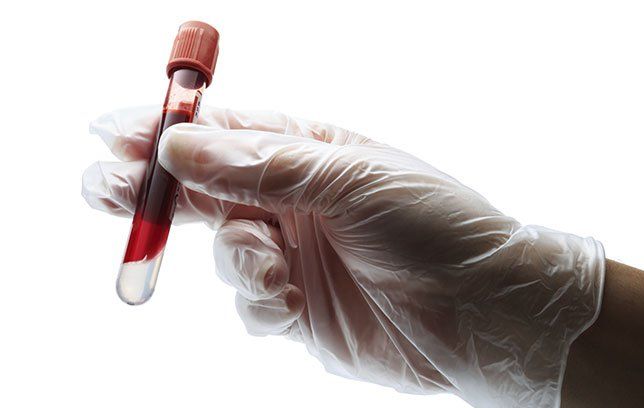The Benefits Of Regular Blood Tests: Monitoring Your Health

Regular blood tests are an essential component of preventive healthcare that enable doctors to detect potential health issues before they become more serious.
Blood tests help to identify nutrient deficiencies and monitor the effectiveness of medical treatments.
They also provide insights into the functioning of various organs, including the liver and kidneys, and hormone levels in the body.
Therefore, regular blood tests are an important tool for proactive healthcare and can help individuals take control of their health and well-being.
By monitoring their health regularly through blood tests, individuals can identify potential health issues early on and take appropriate steps to address them.
This can help prevent more serious health problems, reduce the risk of chronic diseases, and improve overall quality of life.
With the help of healthcare providers, individuals can use blood test results to create tailored health plans that address their specific needs and help them achieve their health goals.
Key Takeaways
- Regular blood tests can help detect potential health issues before they become more serious and allow individuals to take appropriate steps to address them.
- Blood tests provide insights into the functioning of various organs and hormone levels in the body, making them an important tool for proactive healthcare.
- Monitoring chronic conditions requires consistent attention to treatment plans and self-care practices, and regular blood tests can play a vital role in ensuring that treatment plans are effective.
- Regular blood tests can help individuals make informed decisions about their health and develop a plan for monitoring and addressing any potential issues, leading to better health outcomes.
Understanding the Importance of Blood Tests for Health Monitoring
An essential aspect of health monitoring is regular blood testing, as it provides valuable insights into an individual’s overall health status and helps to identify potential health issues early on. Blood tests are an important part of preventive medicine, as they can detect certain diseases before symptoms appear.
These tests can also help to monitor existing conditions, such as diabetes or heart disease, and provide information to doctors about how well treatments are working. Blood tests can reveal a wide range of information about an individual’s health. They can measure levels of different substances in the blood, such as glucose, cholesterol, and triglycerides, which are indicators of metabolic health.
They can also detect certain infections, such as HIV, hepatitis, and Lyme disease. Additionally, blood tests can provide information about the function of different organs, such as the liver, kidneys, and thyroid gland. Overall, regular blood testing is an important tool for maintaining good health, preventing disease, and managing existing conditions.
Detecting Health Issues Early On
Identifying potential health concerns at an early stage through timely medical examination is crucial in ensuring optimal health outcomes. Regular blood tests play a significant role in disease prevention and early detection. By analyzing blood samples, healthcare professionals can detect a wide range of health conditions before the symptoms become apparent. Blood tests can help diagnose various health problems such as infections, anemia, liver or kidney problems, cancer, and diabetes, among others. Early detection of these issues can lead to timely intervention and treatment, improving the chances of successful outcomes.
To demonstrate the importance of regular blood tests, the following table outlines some common blood tests and what they can reveal about one’s health:
| Blood Test | What it Reveals |
|---|---|
| Complete Blood Count (CBC) | Overall health, blood cell counts, anemia, infection |
| Lipid Panel | Cholesterol levels, risk of heart disease |
| Glucose Test | Blood sugar levels, risk of diabetes |
| Liver Function Test | Liver health, signs of liver disease |
| Kidney Function Test | Kidney health, signs of kidney disease |
By regularly monitoring these and other blood tests, individuals can stay on top of their health, detect any potential issues early on, and take appropriate action to maintain optimal health. Overall, regular blood testing is a simple yet effective way to monitor one’s health and take proactive steps towards a healthier future.
Tracking the Effectiveness of Medical Treatments
Tracking the effectiveness of medical treatments involves measuring the impact of interventions on patients’ health outcomes and providing insights into the efficacy of different treatment options. Regular blood tests are an essential tool in this process, as they allow doctors to monitor the progress of patients throughout the course of their treatment. By measuring biomarkers in the blood, doctors can assess whether a particular treatment is having the desired effect or if adjustments need to be made.
One of the main benefits of tracking the effectiveness of medical treatments using blood tests is that it allows doctors to tailor treatments to individual patients. By monitoring how a patient’s body is responding to a treatment, doctors can make informed decisions about whether to continue with the current course of treatment or to switch to a different approach.
Additionally, blood tests can alert doctors to potential side effects of treatments, allowing them to take action before the side effects become severe. Overall, regular blood tests are an essential tool in the effective monitoring of medical treatments and can help to improve patient outcomes.
Key benefits of tracking the effectiveness of medical treatments using blood tests:
- Tailoring treatments to individual patients
- Monitoring how a patient’s body is responding to a treatment
- Making informed decisions about whether to continue or switch treatments
- Alerting doctors to potential side effects
- Taking action before side effects become severe
- Improving patient outcomes.
Identifying Nutritional Deficiencies
Adequate nutrition is essential for maintaining good health and preventing disease. However, identifying nutritional deficiencies can be challenging, as symptoms may not appear until the deficiency has become severe.
Regular blood testing can help detect nutritional deficiencies early on, allowing for prompt treatment and prevention of potential health problems. Blood tests can measure levels of various vitamins and minerals, such as iron, vitamin D, and vitamin B12. A deficiency in any of these nutrients can lead to a range of health issues, such as fatigue, weakness, anemia, and bone disorders.
By monitoring these levels through regular blood testing, healthcare professionals can identify deficiencies and recommend appropriate dietary changes or supplements. In some cases, the deficiency may be indicative of an underlying health condition, such as celiac disease or Crohn’s disease, which can then be further investigated and treated.
Overall, regular blood testing is an important tool in maintaining optimal nutrition and preventing nutritional deficiencies.
Monitoring Chronic Conditions
Managing chronic conditions requires consistent attention to treatment plans and self-care practices in order to minimize symptoms and improve overall quality of life. Regular blood tests can play a vital role in monitoring chronic conditions and ensuring that treatment plans are effective. By regularly monitoring certain biomarkers, healthcare professionals can adjust treatment plans as needed and potentially prevent further complications.
A table can be a useful tool in illustrating the importance of regular blood tests for monitoring chronic conditions. The table below provides examples of chronic conditions and their corresponding biomarkers that should be regularly monitored. By regularly monitoring these biomarkers, healthcare professionals can track the progression of the condition and adjust treatment plans accordingly.
| Chronic Condition | Biomarkers to Monitor | Frequency of Testing |
|---|---|---|
| Diabetes | Blood glucose levels | Every 3 months |
| Hypertension | Blood pressure | Every 6 months |
| Chronic Kidney Disease | Serum creatinine and estimated glomerular filtration rate (eGFR) | Every 3-6 months |
| Asthma | Peak flow readings | Every 3-6 months |
Regular blood tests are an important tool in managing chronic conditions. By monitoring biomarkers, healthcare professionals can adjust treatment plans as needed and potentially prevent further complications. The use of a table can help illustrate the importance of regular blood tests for monitoring chronic conditions.
Assessing Liver and Kidney Function
Assessing liver and kidney function plays a crucial role in evaluating the overall health status of individuals with chronic conditions. Both organs are essential for detoxification and elimination of waste products from the body.
A blood test that measures liver function includes markers such as ALT, AST, bilirubin, and alkaline phosphatase, which can indicate liver damage or disease. Elevated levels of these markers may suggest liver inflammation, hepatitis, or liver disease.
Similarly, a blood test that measures kidney function includes creatinine and blood urea nitrogen (BUN), which can indicate kidney damage or disease. Elevated levels of creatinine and BUN may suggest impaired kidney function or kidney disease.
Regular blood tests that assess liver and kidney function can help healthcare professionals detect and monitor chronic conditions such as diabetes, hypertension, and cardiovascular disease. These conditions can cause damage to the liver and kidneys over time and lead to serious complications.
By monitoring liver and kidney function through regular blood tests, doctors can identify any changes in the markers and intervene early to prevent further damage. Additionally, regular blood tests can provide individuals with chronic conditions with peace of mind, as they can monitor their health status and take proactive steps to manage their conditions.
Overall, assessing liver and kidney function through regular blood tests is an important tool in managing and monitoring chronic conditions.
Checking Hormone Levels
Checking hormone levels is a crucial aspect of evaluating the endocrine system’s functioning, which plays a vital role in regulating various bodily processes, such as metabolism, growth and development, and reproductive functions. Hormones are chemical messengers that travel through the bloodstream and communicate with different organs and tissues to regulate their functions.
Any imbalance in hormone levels can lead to various health problems, such as diabetes, thyroid disorders, and sexual dysfunction. Therefore, regular blood tests to check hormone levels can help detect any hormonal imbalances and facilitate early intervention.
The endocrine system comprises several glands that produce hormones, such as the pituitary gland, thyroid gland, adrenal gland, and pancreas. A blood test can measure the levels of different hormones, such as insulin, cortisol, testosterone, estrogen, progesterone, and thyroid hormones. Depending on the patient’s age, gender, and symptoms, the doctor may recommend specific hormone tests.
For instance, women experiencing irregular periods, weight gain, and mood swings may be advised to check their estrogen and progesterone levels. Similarly, men experiencing low libido, fatigue, and muscle weakness may need to check their testosterone levels.
Overall, regular blood tests to check hormone levels can help identify any hormonal imbalances and facilitate timely medical intervention.
Discussing Results with Your Healthcare Provider
Interpreting hormone level results is crucial for understanding the functioning of the endocrine system and devising appropriate treatment plans. A healthcare provider will be able to interpret the results and provide recommendations for addressing any abnormalities or imbalances. It is important to discuss these results with a healthcare provider because they can provide insight into the potential causes of any imbalances and recommend lifestyle changes or medications as needed.
When discussing hormone level results with a healthcare provider, it is important to come prepared with any relevant information about your medical history and current symptoms. Additionally, it can be helpful to ask questions about the meaning of the results and how they may impact your health. By having an open and honest conversation with your healthcare provider, you can make informed decisions about your health and develop a plan for monitoring and addressing any potential issues.
| Hormone | Normal Range |
|---|---|
| Estrogen | 30-400 pg/mL |
| Testosterone | 300-1000 ng/dL |
| Progesterone | 0.2-25 ng/mL |
| Thyroid Stimulating Hormone (TSH) | 0.4-4.0 mIU/L |
Table 1: Normal ranges for hormone levels in adults. It is important to note that normal ranges can vary depending on factors such as age, sex, and pregnancy status. Consult with a healthcare provider for personalized information and interpretation of results.
Conclusion
In conclusion, regular blood tests are an essential component of monitoring overall health and detecting potential health issues early on. By tracking the effectiveness of medical treatments, identifying nutritional deficiencies, and monitoring chronic conditions, blood tests provide a wealth of information to healthcare providers. They also allow for the assessment of liver and kidney function, as well as checking hormone levels.
Discussing the results of blood tests with a healthcare provider is crucial for understanding potential health risks and developing an appropriate plan of action. Regular blood tests can help individuals take control of their health and make informed decisions about their well-being. By staying proactive and scheduling routine blood tests, individuals can protect their health and improve their quality of life in the long run.








